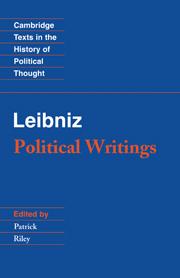Book contents
- Frontmatter
- Contents
- Preface to the Second Edition
- Abbreviations
- Introduction
- Part I On Justice and Natural Law
- Part II On Social Life, Enlightenment and the Rule of Princes
- Part III On State-Sovereignty and Hobbesian Ideas
- Part IV On the Defense of Hapsburg Europe against France
- Part V On International Relations and International Law
- Part VI Political Letters
- 13 Excerpts from Letters to Landgraf Ernst of Hesse-Rheinfels, Bossuet and Thomas Burnett
- 14 Judgment of the Works of the Earl of Shaftesbury (1712)
- Part VII Sovereignty and Divinity: Unpublished Manuscripts, 1695–1714
- Critical Bibliography
- Index
13 - Excerpts from Letters to Landgraf Ernst of Hesse-Rheinfels, Bossuet and Thomas Burnett
Published online by Cambridge University Press: 05 June 2012
- Frontmatter
- Contents
- Preface to the Second Edition
- Abbreviations
- Introduction
- Part I On Justice and Natural Law
- Part II On Social Life, Enlightenment and the Rule of Princes
- Part III On State-Sovereignty and Hobbesian Ideas
- Part IV On the Defense of Hapsburg Europe against France
- Part V On International Relations and International Law
- Part VI Political Letters
- 13 Excerpts from Letters to Landgraf Ernst of Hesse-Rheinfels, Bossuet and Thomas Burnett
- 14 Judgment of the Works of the Earl of Shaftesbury (1712)
- Part VII Sovereignty and Divinity: Unpublished Manuscripts, 1695–1714
- Critical Bibliography
- Index
Summary
The following excerpts from seven letters written by Leibniz between 1683 and 1712 give some sense of the range of his political interests. To Landgraf Ernst he speaks mainly of the idea of a ‘right of resistance’ to rulers, concluding that ordinarily such resistance is unjustifiable, and almost always unwise; to Bossuet he suggests means of re-uniting the ‘Republic of Christendom’ under a reformed (and tolerant) Catholic Church; for Thomas Burnett he provides his fullest account of constitutional government and of natural élites, and makes characteristic remarks about the public duties of great scientists (like Newton) and about French aggression and possible means of containing it. (The letters to Landgraf Ernst are to be found in Rommer's Leibniz und Landgraf Ernst von Hesse-Rheinfels; those to Bossuet are in vols. I and II of Foucher de Careil's edition; and those to Burnett are contained in vol. III of Gerhardt's edition.)
EXCERPTS FROM TWO LETTERS TO LANDGRAF ERNST OF HESSERHEINFELS CONCERNING ABSOLUTE POWER AND RESISTANCE (1683–91)
1. The question whether it is good to have hereditary and absolute princes can be taken in several senses – one, whether the people are obliged to obey them, and two, whether a prince can in good conscience claim such a right, and exercise it, if it is transmitted to him by his ancestors.
- Type
- Chapter
- Information
- Leibniz: Political Writings , pp. 185 - 195Publisher: Cambridge University PressPrint publication year: 1988



